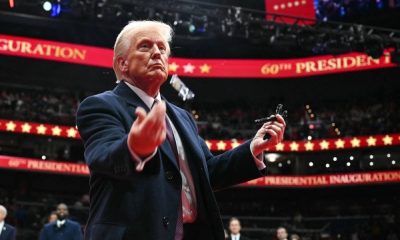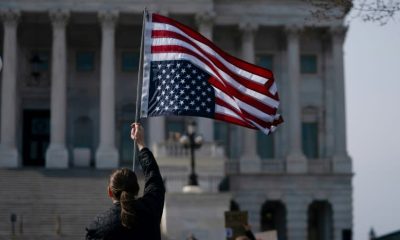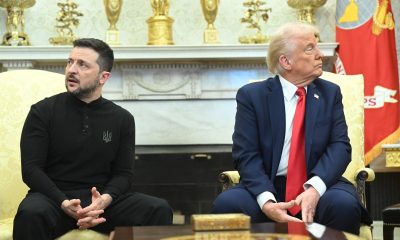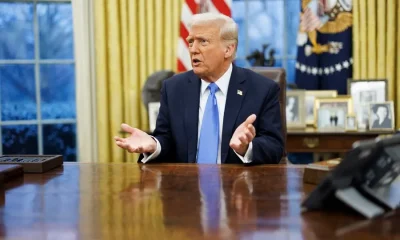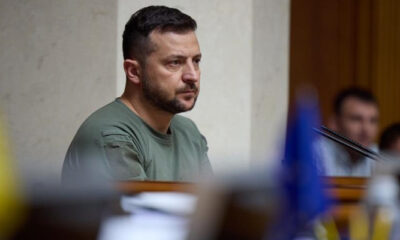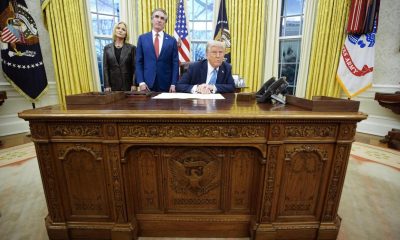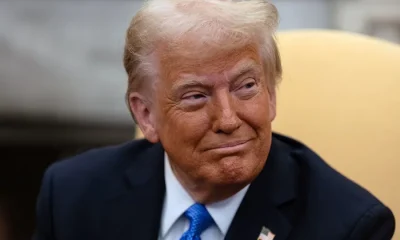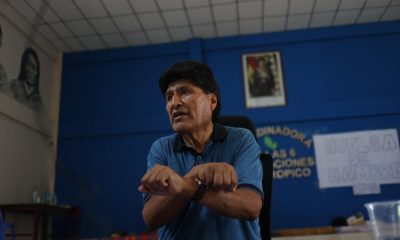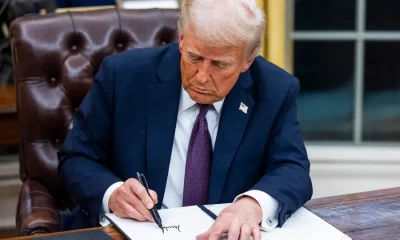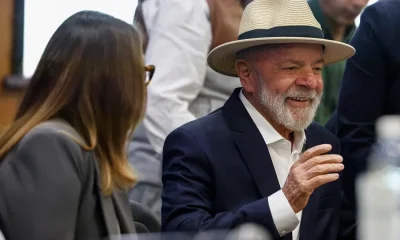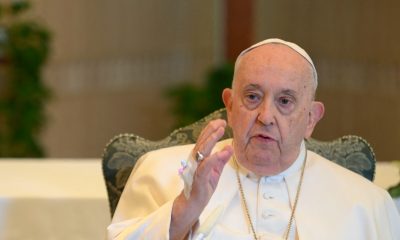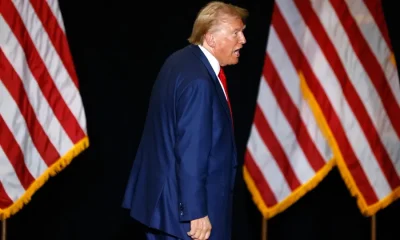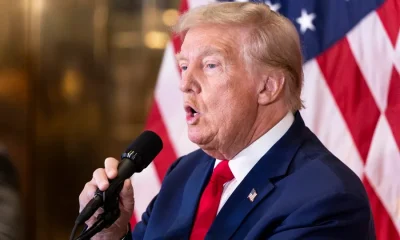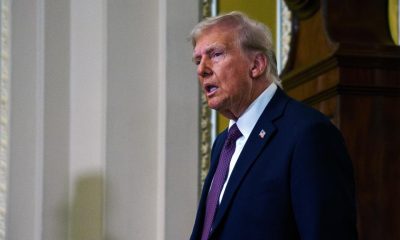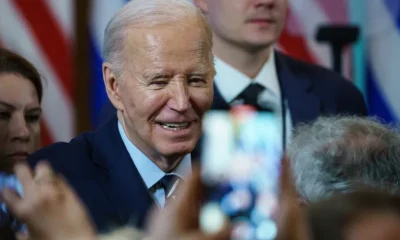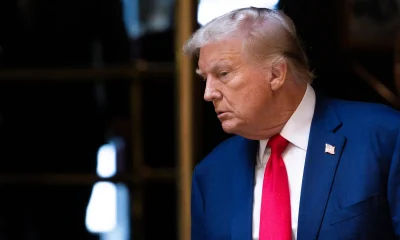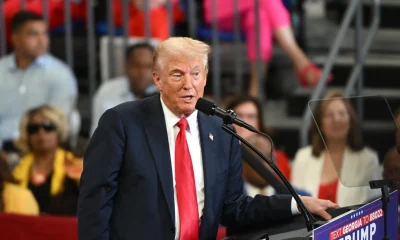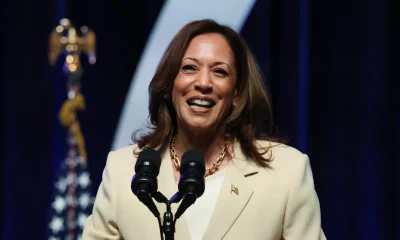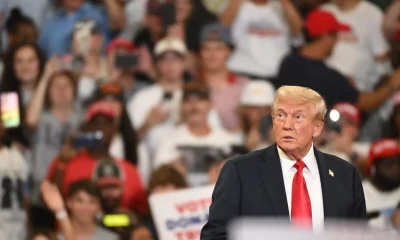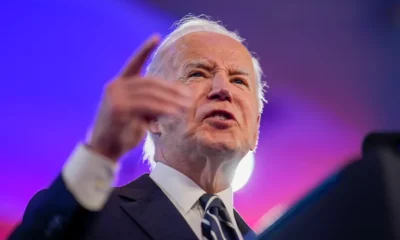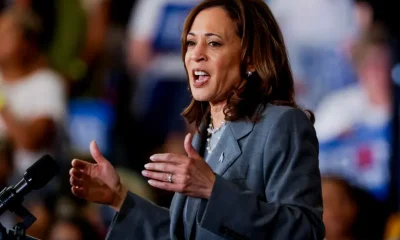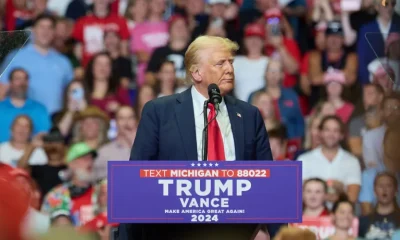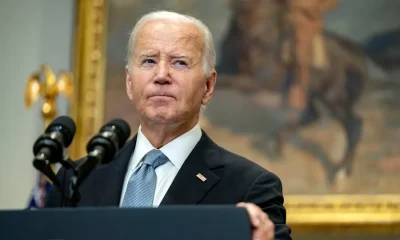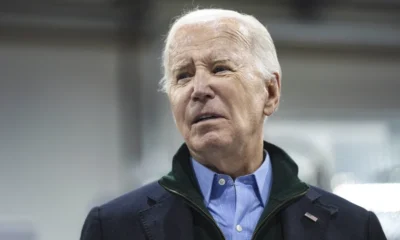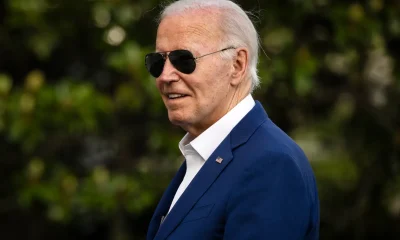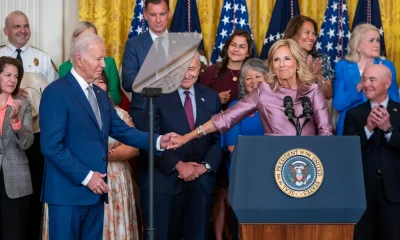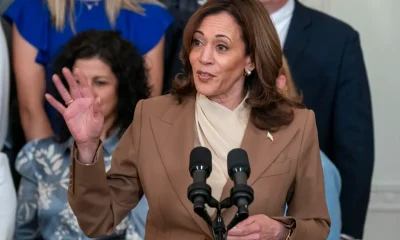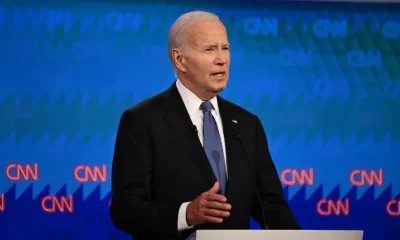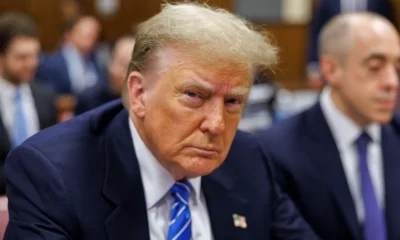International
Biden, Trump clash on eve of midterms set to upend Washington
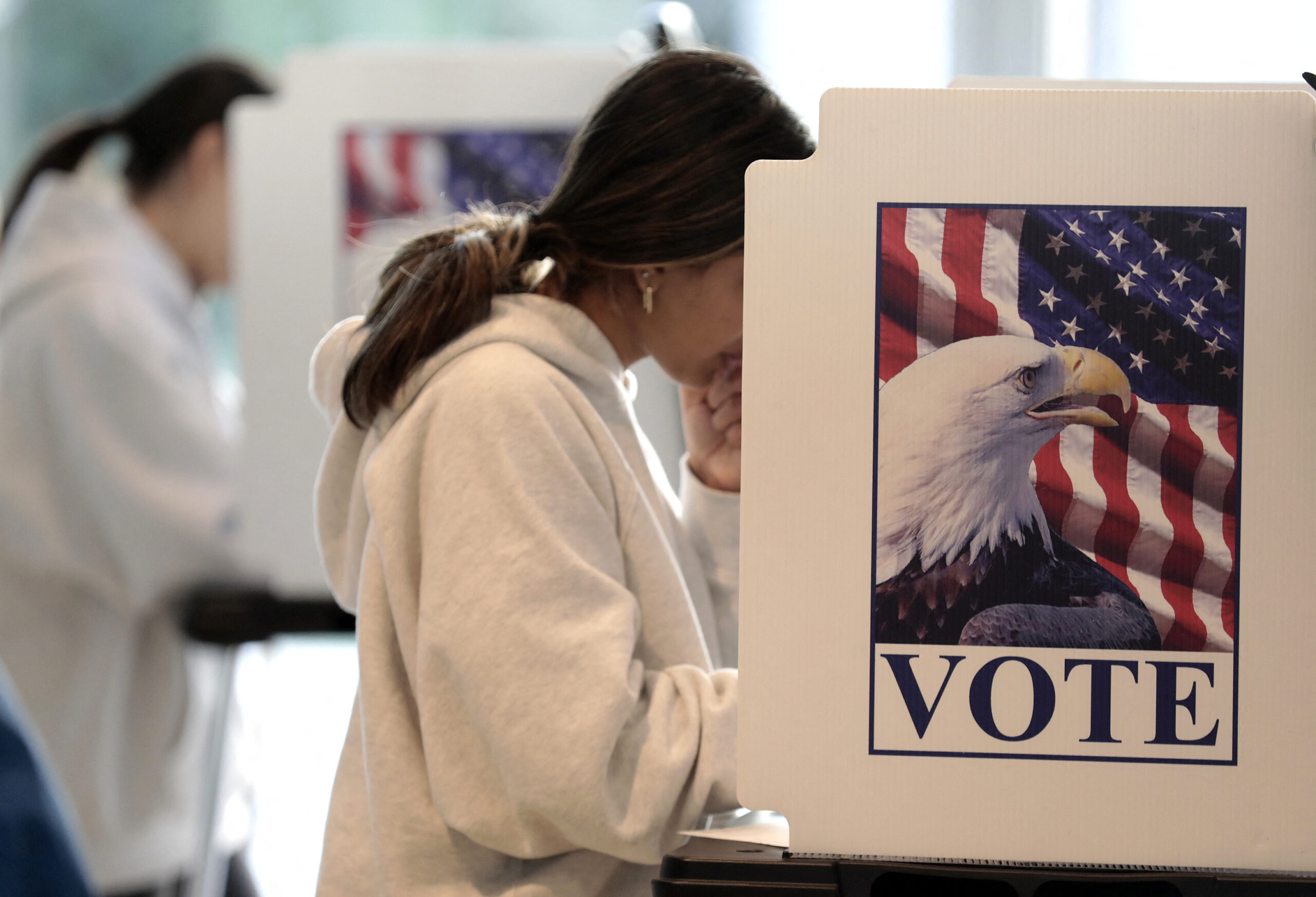
| By AFP | Sebastian Smith |
Republicans and Democrats traded final blows Monday ahead of midterm elections that could upend Joe Biden’s presidency, weaken Western support for Ukraine and even open the door to a comeback bid by Donald Trump.
More than 40 million ballots have been cast through early voting options, meaning the outcome was already taking shape with hours to go before polls open nationwide Tuesday.
In a typically attention-grabbing move, Elon Musk used his newly purchased Twitter social media site to endorse a Republican takeover of Congress.
“Shared power curbs the worst excesses of both parties,” the world’s richest person tweeted to his 114 million followers. “Therefore I recommend voting for a Republican Congress, given that the Presidency is Democratic.”
Adding to tensions — and a reminder of Moscow’s murky role throughout Trump-era US politics — Kremlin-connected oligarch Yevgeny Prigozhin boasted that Russia was trying to tilt the outcome.
“We interfered, we are interfering and we will interfere… carefully, precisely, surgically and the way we do it, the way we can,” said Prigozhin, a pivotal figure in the Ukraine invasion where his Wagner military contractor group is on the front lines.
Biden, who has framed his closing argument as a warning that American democracy is on the line, was set to close out days of frantic campaigning for Democratic candidates at a rally Monday evening near Baltimore.
Trump — using the midterms to repeatedly tease a possible 2024 White House run, even as he faces criminal probes over taking secret documents and trying to overturn the 2020 election — was holding a rally in Ohio.
With polls showing Republicans in line to seize the House of Representatives, the increasingly far-right party eyed snarling the rest of Biden’s first term in aggressive investigations and opposition to spending plans.
Kevin McCarthy, who would likely become speaker of the House — placing him second in line to the president — also refused to rule out impeachment proceedings.
“We will never use impeachment for political purposes,” McCarthy told CNN. “That doesn’t mean if something rises to the occasion, it would not be used at any other time.”
One key question remained whether the US Senate would also flip, leaving Biden as little more than a lame duck.
With Congress out of Democrats’ hands, Biden would see his legislative agenda collapse.
That would raise questions over everything from climate crisis policies, which the president will be laying out at the COP27 conference in Egypt this week, to Ukraine, where Republicans are reluctant to maintain the current rate of US financial and military support.
While insisting he supports Ukraine’s struggle, McCarthy told CNN there could be no “blank check” — a nod to the isolationist, far-right Trump wing of his party and a signal likely sending shivers through Kyiv.
Just how bad Tuesday goes will also likely determine whether Biden, who turns 80 this month and is the oldest president ever, will seek a second term or step aside, plunging his party into fresh uncertainty.
‘Wake-up call’
Up for grabs are all 435 House seats, a third of the 100 Senate seats, and a slew of state-level posts.
Popular former president Barack Obama and other Democratic stars have been racing from campaign to campaign in hopes of seeing off the predicted Republican “red wave.”
But the political landscape has been tilting away from Democrats since the summer, as Republican messaging about high inflation, crime and illegal immigration overwhelmed the incumbents.
“This is going to be a wake-up call to President Biden,” was the bullish weekend prediction of Glenn Youngkin, Virginia’s Republican governor and a rising star being touted as a possible party alternative to Trump in 2024.
The Senate is more of a toss-up but Democratic hopes of keeping the upper chamber, which they currently only barely control thanks to the tiebreaking vote from Vice President Kamala Harris, hang in the balance.
Dave Wasserman of the nonpartisan Cook Political Report told MSNBC there could be a Republican gain of 15-25 House seats, while “Republicans might gain the one seat they need to win control of the Senate.”
Races in Pennsylvania, Nevada, Arizona, Georgia, Wisconsin, New Hampshire and Ohio have narrowed to projected photo finishes, and any one of them could swing the balance of power.
Democrats have focused their closing arguments on voting rights, protecting abortion access and welfare — and on the threat posed by growing support among Trump Republicans for political conspiracy theories.
Republicans counter that a vote for Democrats means more soaring inflation and crime.
International
Bolivia Orders Three Investigations Into Deadly Military Plane Crash

Bolivia’s Defense Minister Marcelo Salinas announced Monday that three separate investigations will be conducted into Friday’s crash of a military cargo aircraft at El Alto International Airport, near La Paz, which left at least 22 people dead.
The Hercules aircraft, operated by the Fuerza Aérea Boliviana (FAB), was transporting cash intended for the Central Bank of Bolivia when it overshot the runway after landing from the city of Santa Cruz. The plane reportedly traveled nearly one kilometer beyond the airport perimeter.
The incident sparked chaotic scenes, with individuals attempting to collect scattered banknotes. Authorities detained 51 people in the aftermath, and the government declared three days of national mourning.
Multiple Investigations Underway
The first inquiry is being led by a military board from the Bolivian Air Force, which has already taken custody of the aircraft’s black box for analysis.
Minister Salinas said two additional investigations will follow — one conducted by the insurance company and another by the aircraft’s manufacturer.
“At least two more investigations will come, that of the insurance company and that of the aircraft manufacturer,” Salinas said during a press conference in Santa Cruz.
He cautioned that the investigative process could take between three and six months, noting that the black box cannot be opened in Bolivia due to the lack of specialized laboratories for analysis.
Awaiting Official Findings
Salinas stressed that the FAB investigative board is the highest authority in the case and urged the public to wait for its conclusions to avoid speculation about the causes of the crash.
He also confirmed that the government has contacted the families of the 22 victims and the 37 injured, as well as the owners of 15 damaged vehicles, to coordinate procedures with the insurer and cover the corresponding expenses.
International
Mexico Calls for Immediate Probe After National Dies in ICE Custody

Mexico’s Secretaría de Relaciones Exteriores (SRE) on Monday called on U.S. authorities to conduct an “immediate and thorough” investigation into the death of a Mexican national while in custody of U.S. Immigration and Customs Enforcement (ICE) at a processing facility in California.
In a statement, the Mexican government described the death as “regrettable” and urged U.S. officials to clarify the circumstances surrounding the case in order to “determine responsibilities and ensure that such events do not happen again.”
Death at Adelanto Processing Center
According to available information, the Mexican citizen died at the Adelanto Processing Center in California while under ICE custody. Authorities have not yet released the individual’s identity or the cause of death.
Following the incident, Mexico’s Foreign Ministry formally requested “detailed information” from U.S. authorities, including the detainee’s medical records and custody reports.
Consular Assistance Activated
The Mexican Consulate in San Bernardino, California, has activated consular assistance protocols to provide ongoing support to the deceased’s family. Officials have contacted relatives to express condolences and offer legal guidance, as well as assistance with the necessary procedures to repatriate the remains.
“The handling of situations like this and the establishment of mechanisms to resolve them are priorities for the Government of Mexico,” the Foreign Ministry said, adding that it will formally request an investigation into any systemic conditions that may have contributed to such incidents.
Local Mexican media reported that seven Mexican nationals died while in ICE detention last year — the highest number recorded since the agency was created.
International
Anti-ICE Billboard Campaign Targets Immigration Spending in 31 U.S. Cities

More than 200 billboards criticizing U.S. Immigration and Customs Enforcement (ICE) began appearing Monday in 31 cities across the United States, including Miami, as part of a campaign highlighting the high cost of immigration enforcement operations for taxpayers.
The initiative, titled “ICE Costs Us,” was launched by the civil rights organization Mijente and will run for four weeks.
Criticism of Spending and Enforcement Tactics
The billboards feature images of ICE agents during arrests or carrying military-style weapons. According to the organization, spending on military-grade equipment for the agency has increased by 600 percent in recent years.
Several signs display messages such as:
“Your taxes are being wasted” and “ICE’s cruelty costs you $28 billion,” referring to the agency’s annual budget.
In a statement, Marisa Franco, co-founder of the Mijente Support Committee, said:
“For too long, our government has prioritized building cages and investing billions in an immigration enforcement apparatus that has left families torn apart and communities terrified.”
She added that “Millions of Americans are living paycheck to paycheck, yet this violent agency continues operating with a blank check. These decisions do not make us safer nor improve our economic security. Our billboards highlight these choices and demand a different path.”
Budget Debate and Medicaid Comparison
The campaign also draws a comparison between ICE’s funding and the estimated 17 million people who could lose health coverage under Medicaid due to federal budget cuts under President Donald Trump.
Other billboard messages seen in various cities include:
“They get billions to beat us; we get layoffs and rising rents” and “Funding ICE is a fast track to fascism.”
Organizers say the goal is to spark public debate about the allocation of federal funds for immigration enforcement and the broader economic and social impact of such policies on communities nationwide.
-

 International2 days ago
International2 days agoIran Reports 201 Dead, 747 Injured After U.S. and Israeli Strikes
-

 International5 days ago
International5 days agoCocaine Production Surges 34% in 2023 as Market Expands into Africa and Asia
-

 International4 days ago
International4 days agoTrump Floats “Friendly Takeover” of Cuba Amid Rising Tensions
-

 International2 days ago
International2 days agoPope Leo XIV Urges End to ‘Spiral of Violence’ in Middle East
-

 Sin categoría3 days ago
Sin categoría3 days agoTrump: ‘We Think It’s True’ Amid Claims Iran’s Supreme Leader Was Killed
-

 International3 days ago
International3 days agoSecurity Council to Hold Emergency Meeting on Middle East Crisis
-

 International20 hours ago
International20 hours agoBrazil’s Supreme Court Rejects Bolsonaro’s Bid for House Arrest
-

 International5 days ago
International5 days agoFederal Judge Blocks Trump Policy Allowing Deportations to Third Countries
-

 International4 days ago
International4 days agoArgentina’s Senate Reviews Milei-Backed Labor Overhaul
-

 International20 hours ago
International20 hours agoAnti-ICE Billboard Campaign Targets Immigration Spending in 31 U.S. Cities
-

 International5 days ago
International5 days agoClinton Accuses Republican Committee of Using Epstein Case to Shield Trump
-

 International20 hours ago
International20 hours agoTrump Warns of ‘Major Wave’ of Attacks as Iran Conflict Escalates
-

 International20 hours ago
International20 hours agoMexico Calls for Immediate Probe After National Dies in ICE Custody
-

 Central America20 hours ago
Central America20 hours agoPanama Canal Monitoring Trade as Middle East Conflict Disrupts Shipping
-

 International20 hours ago
International20 hours agoBolivia Orders Three Investigations Into Deadly Military Plane Crash





























